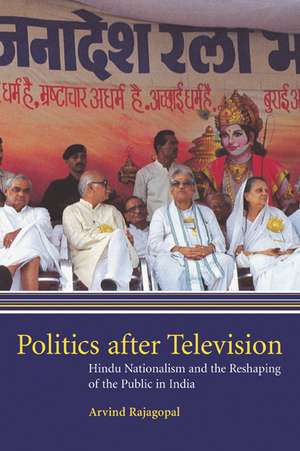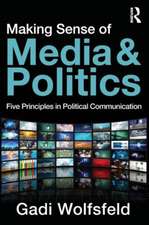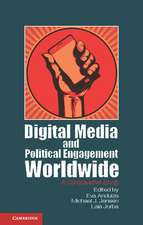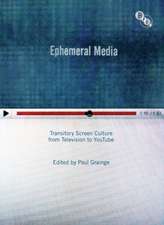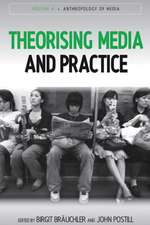Politics after Television: Hindu Nationalism and the Reshaping of the Public in India
Autor Arvind Rajagopalen Limba Engleză Paperback – 24 ian 2001
| Toate formatele și edițiile | Preț | Express |
|---|---|---|
| Paperback (1) | 400.27 lei 6-8 săpt. | |
| Cambridge University Press – 24 ian 2001 | 400.27 lei 6-8 săpt. | |
| Hardback (1) | 760.32 lei 6-8 săpt. | |
| Cambridge University Press – 21 ian 2001 | 760.32 lei 6-8 săpt. |
Preț: 400.27 lei
Nou
Puncte Express: 600
Preț estimativ în valută:
76.59€ • 79.81$ • 63.42£
76.59€ • 79.81$ • 63.42£
Carte tipărită la comandă
Livrare economică 03-17 aprilie
Preluare comenzi: 021 569.72.76
Specificații
ISBN-13: 9780521648394
ISBN-10: 0521648394
Pagini: 404
Dimensiuni: 152 x 229 x 23 mm
Greutate: 0.59 kg
Ediția:New.
Editura: Cambridge University Press
Colecția Cambridge University Press
Locul publicării:Cambridge, United Kingdom
ISBN-10: 0521648394
Pagini: 404
Dimensiuni: 152 x 229 x 23 mm
Greutate: 0.59 kg
Ediția:New.
Editura: Cambridge University Press
Colecția Cambridge University Press
Locul publicării:Cambridge, United Kingdom
Cuprins
Introduction; 1. Hindu nationalism and the cultural forms of Indian politics; 2. Prime time religion; 3. The communicating thing and its public; 4. A 'Split Public' in the making and unmaking of the Ram Janmabhumi movement; 5. Organization, performance and symbol; 6. Hindutva goes global; Conclusion.
Recenzii
'This beautifully written book will surely become a classic in media and globalization studies and in the cultural sociology of contemporary India.' Arjun Appadurai, University of Chicago
'A theoretically rich and sophisticated contribution to the development of transnational cultural studies in which the comparisons do not always have to start from the assumed baseline of European-American cultural experience. This analysis of the heady mix of communalism, nationalism, market liberalism and consumerism in the case of recent Indian experience is replete with illuminating parallels for the study of the cultural dynamics of other sectors of the emerging global marketplace.' David Morley, Goldsmith's College, University of London
'Rajagopal changes our way of thinking about the world, not only in India, but everywhere: his book is indispensable for anyone who wants to understand how globalism and localism intersect.' Robert N. Bellah, author of Habits of the Heart
'Politics After Television … [w]ith brilliant theoretical acuity and empirical richness … analyzes how television redefines and forms part of a new circuit of politics and public culture in India. This is a superb and stimulating contribution to the study of contemporary politics in India.' Gyan Prakash, Princeton University
'… essential reading for anyone interested in understanding the growing influence of television in India.' Screen
'… a fascinating and illuminating book .' Copenhagen Journal of Asian Studies
'A theoretically rich and sophisticated contribution to the development of transnational cultural studies in which the comparisons do not always have to start from the assumed baseline of European-American cultural experience. This analysis of the heady mix of communalism, nationalism, market liberalism and consumerism in the case of recent Indian experience is replete with illuminating parallels for the study of the cultural dynamics of other sectors of the emerging global marketplace.' David Morley, Goldsmith's College, University of London
'Rajagopal changes our way of thinking about the world, not only in India, but everywhere: his book is indispensable for anyone who wants to understand how globalism and localism intersect.' Robert N. Bellah, author of Habits of the Heart
'Politics After Television … [w]ith brilliant theoretical acuity and empirical richness … analyzes how television redefines and forms part of a new circuit of politics and public culture in India. This is a superb and stimulating contribution to the study of contemporary politics in India.' Gyan Prakash, Princeton University
'… essential reading for anyone interested in understanding the growing influence of television in India.' Screen
'… a fascinating and illuminating book .' Copenhagen Journal of Asian Studies
Descriere
An analysis of the use of media by political and religious interest groups in India
